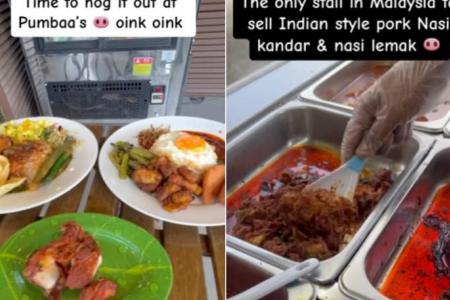Malaysia eatery offers 'pork nasi kandar' after initial objection from Muslim group
Malaysians have expressed mixed reactions at a local eatery offering pork dishes in its version of nasi kandar, with some flocking to support the hawker, while a Muslim merchants’ organisation relented to its sale having initially expressed its displeasure, citing possible confusion among Muslim diners.
The stall in question, Pumbaa’s in Petaling Jaya, Selangor, drew attention online after it was featured by a local food influencer’s video on social media as an eatery offering “Malaysia’s first pork nasi kandar” which she described as “porkfection”.
A pork varuval dish and luncheon pork were among the offerings diners could pick, along with other chicken, mutton and vegetable options to top their plates of rice.
The video had initially attracted the ire of some Malaysians, however, who opposed the labelling of the dish as “nasi kandar”, a dish they deemed to be “largely consumed by Muslims”. Some Instagram users warned the hawker of a mishap waiting to happen as soon as a Muslim “mistakenly eats pork at the restaurant”.
Mr Jawahar Ali Khan, president of the Malaysian Muslim Restaurant Owners’ Association (Presma), said on Wednesday he would accept pork nasi kandar being sold, after the stall owner explained food would not be sold to Muslims.
He conceded that Presma had no right to say a certain dish must be halal or served in a certain way, Malaysian daily News Straits Times (NST) reported.
It was a change in tune for the chief of Presma, which counts around 12,000 eateries as its members.
“When someone comes up with such a video claiming that the dish served is nasi kandar, it can only be seen as insulting, insensitive and misleading,” Mr Jawahar had said on Tuesday.
“Customers believe all nasi kandar sold at various outlets is halal Muslim food... (The video) will cause confusion to customers and nasi kandar fans in this country, thus giving a negative image to this much-loved dish.”
The owner of the stall located in a coffee shop disagreed with any potential lack of clarity Muslim diners may face.
“This is a non-halal store, that’s why I sell non-halal dishes, which include pork. I don’t mean to inconvenience anyone,” Mr Suresh Gnanasekaran told NST on Tuesday of his three-week-old outlet.
“I’m just trying to make a living. I sell this food specifically in a Chinese shop, not in residential areas, so my customers are typically non-Muslim.”
He added that the non-halal label was clearly visible on his stall and in social media posts promoting it.
“Even the business logo shows the image of the animal. So, there shouldn’t be any confusion. I’ve registered under the ‘non-halal’ business category,” he pointed out, referring to an image of a warthog emblazoned on his stall.
Locals have flooded Pumbaa’s page on Google Reviews with hundreds of positive reviews that have left it with a maximum 5-star rating, with some pouring scorn on Presma’s concerns of consumers getting confused.
“People should be able to eat whatever they want with whatever dishes they want,” wrote Mr Reza Salleh. “No one was elected official council of nasi kandar police.”
Indian Muslim origins
Nasi kandar is said to have origins in India and was brought to Malaysian shores by Tamil-Muslim immigrants some 70 years ago, according to an official tourism site by Penang’s state government.
The kandar in the dish’s name, a Malay word referring to the use of a pole to carry loads on both its ends, was derived from how the hawkers in the pre-independent Malaysian state would carry and sell their cooked dishes and rice.
Presma’s attempted policing of what is allowed in the dish has been criticised.
“If that were the logic that Muslims could be so easily misled and confused, then all Muslims should stop selling dim sum, yong tau fu, chee cheong fun - which literally means pork intestines (only in name),” former Selangor state assemblyman Teng Chang Khim wrote on Facebook.
A Penang-based expert in Islamic laws, Wan Salim Noor, told news site Malaysiakini there is nothing to stop eateries from selling nasi kandar with pork, as long as they put up notices informing Muslim diners of the non-halal food.
There has been previous quibbling over the permissibility of halal food options in Muslim-majority Malaysia.
A Malay-owned claypot chicken rice eatery in Kuala Lumpur caught the attention of Islamic officials in September for not operating with halal certification, after some accused the operators of using alcoholic rice wine among its ingredients.
Further back in 2009, A&W fast food outlets in Malaysia were forced to rename its root beer as sarsaparilla to be granted halal certification.
In June 2023, members of Malaysia’s parliament debated granting bak kut teh a tourism ministry-designated “national heritage dish” status but faced disagreement over its main ingredient being pork ribs, despite some MPs pointing out versions of the dish using chicken could be permissible.
Get The New Paper on your phone with the free TNP app. Download from the Apple App Store or Google Play Store now


